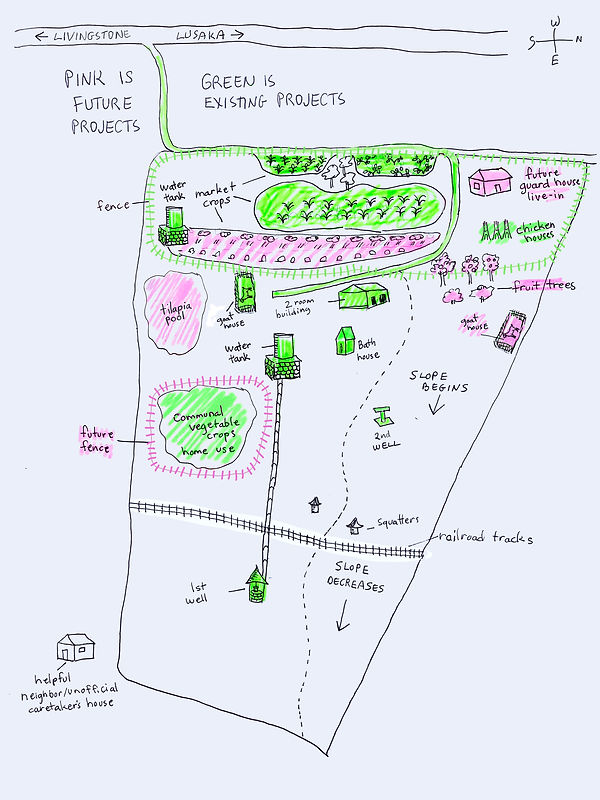COMMUNAL FARM PROJECT
In April 2021, the AACDP started the largest project in our history. It began when we joined GlobalGiving, a nonprofit organization whose mission is to help small, grassroots nonprofits get a share of the donations available to the big charities.
Everybody has heard about the waste of money and resources at the big charities. GlobalGiving makes programs like ours (programs run by people who work directly with their chosen communities, and use all donations to benefit those communities) visible to many levels of donors.
To gain admission to GlobalGiving we participated in a contest. We had to design a project, then raise at least $4000 from a minimum of 40 separate donors to fund it. Our project, "Delivering Food to Hungry Families in Zambia”, was designed to help feed the Mama Bakhita Community, who were left hungry by Zambia's economic crisis. I did not know if we could get enough donors or raise the funds, but we managed to bring in $18,000 from 140 donors! Out of almost 400 entries in the contest, we placed 5th. I was surprised and thrilled. We were able to buy provisions to deliver a month’s worth of food staples to 40 families each month for several months, and still have funds for bigger dreams.
Our ideas for this appeal evolved. At first we thought, well, let's start a food drive for the families in our community who cannot afford food because of the out-of-control inflation. That thought grew to include providing seeds and fertilizer for home gardens. Then Sydney Mwamba (who runs the AACDP in Zambia) had a phenomenal idea. He suggested we start a communal farm. Our community's families are people who come from agricultural backgrounds in their native villages; they know how to produce food and how to market it as well. Everyone was so excited at the prospect of having their own farm!
The AACDP funded the purchase of 20 acres of land that is, by tribal tradition, available only to these people. The farmers, mostly women I have known for years from the Mama Bakhita and the Zambezi Doll Company, cleared the land by hand. Then we began raising funds for an irrigation system to ensure there will be enough water for vegetables to grow in Zambia's frequent droughts. The monumental task of sinking a deep well was accomplished, and a solar powered pump, pipelines, and solar panel stands were installed. That was phase 1.

PHASE 2
The farmers planted three staple crops - soybeans, corn, and peanuts. These are crops that do well on their own, without too much care. Because they need much less water than other vegetables, they were planted on large fields on unirrigated land, saving the irrigated land for the more water-needy vegetables. With proper rain, these plantings should yield enough for the farmers' own consumption, and hopefully surplus to sell at market.
PHASE 3
-
A vegetable garden was created on the irrigated land.
-
A farm vehicle was purchased to transport farmers to the farm and to bring crops to market in the future.
-
Ten goats were purchased and an enclosure for them built.
-
A second well was dug to serve the larger fields. There’s a very good chance that drought will occur more and more frequently in the coming years, so the more underground water sources we can tap, the more prepared we will be to have successful crops despite the weather. Unfortunately the new well led to much less water than hoped, so we are rearranging the pumping systems to better cover our needs.

PHASE 4
We are now calling the farm Zambezi Farm. We have completed a simple shelter and bathhouse for the farmers, so they can stay over and work for a few days without the long commutes back and forth to town each day. We also fenced fields, and began raising chickens.
PHASE 5 & beyond
The map below shows projects in various stages of completion, and also some of our dreams for future projects:
• Fruit orchard
• Tilapia pond
• Chicken run
The more diverse future projects we can create, the more sustainable the farm will be.
Funding this project will be an ongoing labor. It will require a lot of effort and support, but we have both feet on the road toward the time when the farm sustains itself and all those who work on it.
Like many people in the world today, the AACDP and the Mama Bakhita community believe that starting communal farms is one of the most sensible solutions for worldwide hunger. The goal is to put food security in their own hands.


